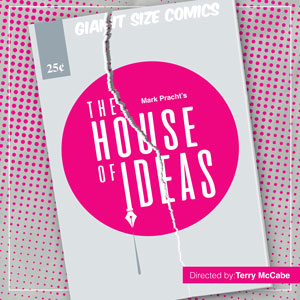
 *** “The House of Ideas”, written by Mark Pracht and directed by Terry McCabe, is the third and final installment of plays about significant moments in comic book history. While the tale builds up to the launch of Marvel Comics in 1961 and the creation of The Fantastic Four, it also has to do with the struggles among staff to get credit for inspiration, hard work, and teamwork. Throughout the show, we follow the career and family life of Jack Kirby (Brian Plocharczyk), a brilliantly talented artist and storyteller, who developed superheroes and villains while working closely with writer and editor Stanley Lieber, a/k/a Stan Lee (Bryan Breau). What ties the play together is the takeaway line: “Ego is the fuel of creativity.”
*** “The House of Ideas”, written by Mark Pracht and directed by Terry McCabe, is the third and final installment of plays about significant moments in comic book history. While the tale builds up to the launch of Marvel Comics in 1961 and the creation of The Fantastic Four, it also has to do with the struggles among staff to get credit for inspiration, hard work, and teamwork. Throughout the show, we follow the career and family life of Jack Kirby (Brian Plocharczyk), a brilliantly talented artist and storyteller, who developed superheroes and villains while working closely with writer and editor Stanley Lieber, a/k/a Stan Lee (Bryan Breau). What ties the play together is the takeaway line: “Ego is the fuel of creativity.”
The story starts in 1939 when Martin Goodman (Brian Parry), founds Timely Comics (which becomes Atlas Comics in 1951 and later Marvel Comics). Goodman initially hires Stanley Lieber as general office manager but then promotes him to editor. Shortly thereafter, Kirby and Joe Simon (Jimmy Hogan) jointly develop a comic book character called “Captain America”, an anti-Nazi superhero, whose tales and travails are published by Timely Comics. Their collaboration continues while serving together in World War II and afterwards. We watch how Kirby moves from Atlas Comics and to DC Comics and then back to Marvel as the business fortunes and personal fortunes of the comic book industry shift over time. All the while, Kirby’s relationships with the various owners and editors constantly change as he fights to gain creative control over his stories and retain rights to his artwork.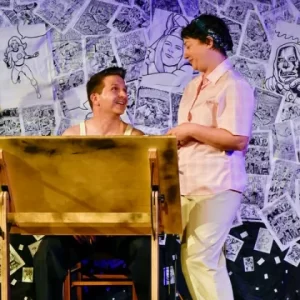
Another takeaway from the show is the line: “Every bright light casts a dark shadow.” While this phrase alludes to the fact that a substantial number of dark characters are found in comic books, it also provides an essential theme for this play: It explains how business interests can often eclipse friendships and how the vicissitudes of “what sells and what doesn’t” can get in the way of creativity. This play exemplifies how the profit motive ultimately outweighs all other considerations among business executives. For example, when Marvel Comics can sell lots of copies of comic books and can subsequently develop movie deals, this can make for a successful business model and lots of executive compensation. Unfortunately, an editor like Stan Lee, who also serves as a manager, can get caught in the middle: between the competing interests of the owners and the employees.
While there are many excellent elements in “The House of Ideas”, there are nevertheless a number of problems with this show. The most obvious one has to do with the inclusion of The All-Seeing Observer (Ben Veatch), who is both narrator and soothsayer. While he constantly changes costumes from ancient to modern dress, he always wears a gold necklace with a huge eye of providence amulet resting on his chest. He foretells the future, summarizes the motivations of the characters, and explains their behavior so that the audience can get up to speed about the various comic book creators. But his inclusion creates too much of a “data dump” at the start of the show and all throughout. I would argue that this character is wholly unnecessary to tell the story. What this means is that the script needs to be structured differently.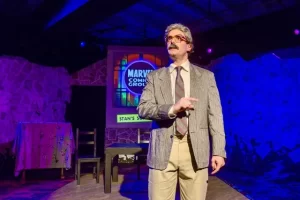
Since not everyone is familiar with or knowledgeable about comic book history, this story needs to draw in a wider audience than those who would concern themselves with this very specialized world of artists, publishers, writers, and editors. So rather than telling the story going forward using lots of narration, it would be better if it were told in flashback: just like the first play in Pracht’s series, called “The Mark of Kane.” In “The Mark of Kane”, comic book history was used as an example of how people can be screwed over in business dealings and how this affected friendships and relationships: something that most audience members can identify with. So instead of starting “The House of Ideas” with the creative impulse between 1939 and 1941, it would be better to begin the story with the San Diego Comicon on August 28, 1987—on the 70th birthday of Jack Kirby—and then delve into the past to explain the origin of his disputes with his coworkers. In fact, panel members from 1987 could provide the necessary context for all of their colleagues’ lives and careers and the decisions that they chose to make over the years.
Scenic, projection, and lighting design are excellently done, thanks to G. “Max” Maxin IV. I liked all the black and white comic book pages pasted to the back walls of the set with a screen for projections in the middle. Color projections of the show’s title, numerous comic book covers, and the names and logos of publishers are featured throughout, and these are very helpful in letting the audience know about the time, place, and context for all of the action. Props design by Jeff Brain make the show realistic, especially the fake cigar that Kirby smokes. Costumes by Beth Laske-Miller are suited to each of the various eras of this tale, from the 1940s through the 1980s, including World War II military uniforms. The sound design and score by Petter Wahlbäck could not have been better. Carrie Hardin also serves as the dialect coach. Additional characters include: Private Dugan (Chad Wise), Corporal Pinkerton (Sean Harklerode), Jack Schiff (Chad Wise), Roz Kirby (Carrie Hardin), Joan Lee (Kate Black-Spence), Greer Grant (Megan Clarke), Jack Leibowitz (Chad Wise), Flo Steinberg (Megan Clarke), Jim Mooney (Sean Harklerode), Stan Goldberg (Jimmy Hogan), Nat Freeland (Jimmy Hogan), Suzie Sutton (Megan Clarke), Carmine Infantino (Sean Harklerode), Menahem Golan (Chad Wise), Jim Shooter (Jimmy Hogan), and Max Schmid (Sean Harklerode).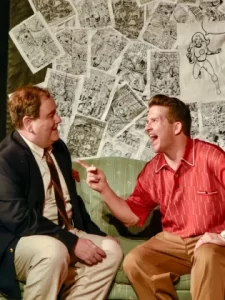
Watching a play about the beginnings of Marvel Comics gives us some idea about how the company became a powerhouse in the industry: especially by creating a compelling family of characters, who have made their way into the movies and beyond comic book fame. While an aficionado of this genre will remember the superheroes and villains from the mid- to late-twentieth century, most people will probably not have this background. To successfully inform the audience, the tale needs to be told from the viewpoint of the panel at Comicon rather than by employing an all-knowing, all-seeing narrator/observer. When the story becomes more fully grounded in reality, the play can more neatly focus on the relationships among the principals, and we don’t get lost in the minutiae.
The world premiere of “The House of Ideas” is running through October 6, 2024, at City Lit Theatre, 1020 W. Bryn Mawr, on the second floor of the Edgewater Presbyterian Church.
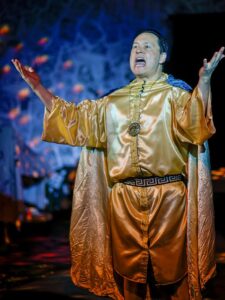 General admission tickets – $35
General admission tickets – $35
Seniors – $30
Students and military – $12
Performance schedule:
Fridays and Saturdays – 7:30 p.m.
Sundays – 3:00 p.m.
Additional performances:
Monday, September 23rd and Monday, September 30th at 7:30 p.m.
For more information and to purchase tickets, visit: https://www.citylit.org/ or boxoffice@citylit.org or phone 773-293-3682.
To see what others are saying, visit www.theatreinchicago.com, go to Review Round-Up and click at “The House of Ideas”.


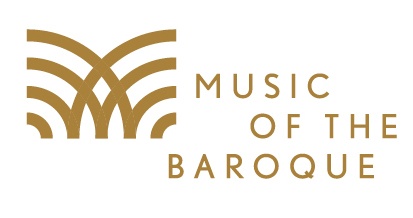


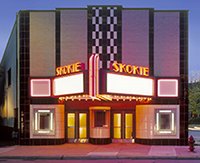
More Stories
“Dummy in Diaspora”
“The Magic School Bus: Lost in the Solar System”
“February House” reviewed by Julia W. Rath